To appeal to all those who are growing older—at every age—we suggest some of the best new books on aging, as well as many classics. You’ll find everything from caregiving advice to memoirs, from humor to reflection, plus narratives by authors who set out, in midlife, in search of wisdom and new ways to think about growing older.
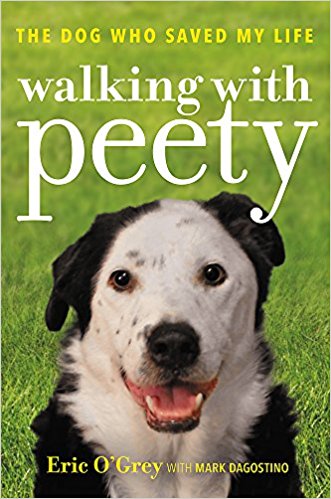 Walking with Peety: The Dog Who Saved My Life Posted in: Inspiring Journeys, Nonfiction
Walking with Peety: The Dog Who Saved My Life Posted in: Inspiring Journeys, NonfictionBy Eric O’Grey with Mark Dagostino – Grand Central Publishing, 2017
Do you know a yo-yo dieter looking for inspiration, maybe a couch potato who needs a nudge in the right direction? Eric O’Grey was in his early 50s, depressed and in a rut. His diets never panned out and he was easily 150 pounds overweight, spending a fortune on prescriptions to control his blood pressure, blood sugar and cholesterol. And then a new doctor prescribed a trip to the dog shelter. There he chose obese, middle-aged Peety, and everything changed. Slowly, due to daily walks, the duo began to take off weight and put on energy. Their bond inspired Eric to finally commit to a radical diet to be deserving of Peety’s love. This is a charming success story that sweetly poses the question: who really rescued whom?
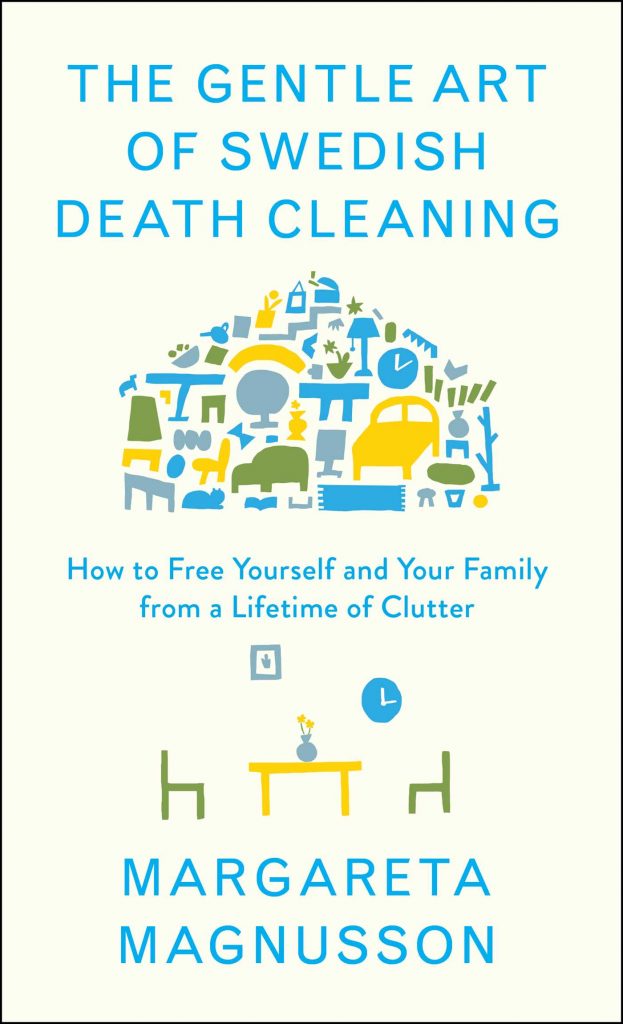 The Gentle Art of Swedish Death Cleaning: How to Free Yourself and Your Family from a Lifetime of Clutter Posted in: Insights from Bold Thinkers, Life’s Endings, Nonfiction
The Gentle Art of Swedish Death Cleaning: How to Free Yourself and Your Family from a Lifetime of Clutter Posted in: Insights from Bold Thinkers, Life’s Endings, NonfictionBy Margareta Magnusson – Scribner, 2018
Sure, you’re a jolly good fellow, but if you’d like to be remembered as such, don’t leave a lifetime’s worth of junk—aka personal collections—for others to clean up when you die. Margareta Magnusson has firsthand experience in dealing with this type of dirty work, which the Swedes call döstädning, or death cleaning. Creepy name, liberating concept. She professes to be “between 80 and 100” and reveals some of what she’s kept and why, as well as the things she has let go, and how. She leaves nothing to the imagination, tackling everything from private matters in bedside drawers to what’s left on social media platforms. If you have attempted to pare down using a different book that promised a changed life but was just too harsh, Magnusson’s humor and practicality may be what you need. You don’t need to toss everything at once: her approach to death cleaning is that it’s a process that should be undertaken again and again as needs change. When the time comes, your family will thank you.
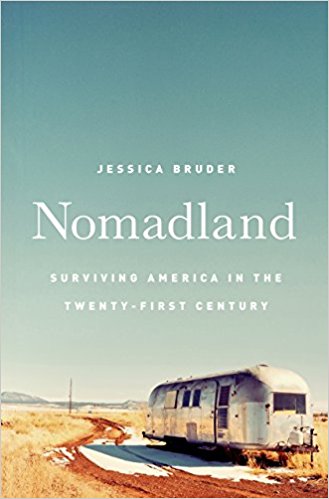 Nomadland: Surviving America in the Twenty-First Century Posted in: Insights from Bold Thinkers
Nomadland: Surviving America in the Twenty-First Century Posted in: Insights from Bold ThinkersBy Jessica Bruder – W.W. Norton, 2017
The American dream of a secure, leisurely retirement is simply not reality for many people. Low-wage workers, and those with insufficient savings due to bad health, poor planning, unlucky investing or the Great Recession, will have to work as long as they live. This book introduces us to the older workforce that is taking to the road for seasonal jobs. That nice 70-something couple managing the campground? Medical bills wiped out their bank account. Older man working at the amusement park? Lost his savings in the housing bust. Many seasonal workers live in their cars, vans or RVs in Walmart parking lots, where they form an unexpected, sometimes dysfunctional community. This house-less lifestyle provides mortgage-free shelter and mobility to people forced to choose between food and keeping a “roof” over their heads. The stories in this book are fascinating. You’ll want to travel along as Bruder explores both the challenges faced and the resilience shown by this generation of workers living life on the road.
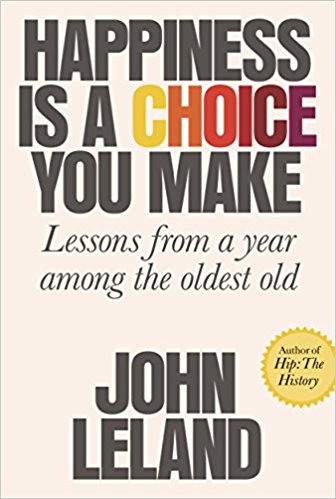 Happiness Is a Choice You Make: Lessons from a Year Among the Oldest Old Posted in: Nonfiction, Views from the Oldest among Us
Happiness Is a Choice You Make: Lessons from a Year Among the Oldest Old Posted in: Nonfiction, Views from the Oldest among UsBy John Leland – Sarah Crichton Books, 2018
New York Times reporter John Leland undertook a project to research old age, not from those studying it but from those living it. He followed six New Yorkers, all 85 or older—no marathoners or record-breakers but everyday folks—and shared the intimate makeup of their days. They lived with and without illness and limitations, independently or with varying degrees of help. Almost everything about them differs, except for the fact that they each have made their way to a place of contentment and slower living that allows a connection with others. Each person fears dying, but not death itself; all six find joy in reminiscing and in plans for tomorrow. As for Leland himself, despite a good relationship with his 89-year-old mother, he was not expecting to enjoy himself in the year he invested with his subjects—he didn’t buy “the older we get, the happier we become” platitudes. But after his year with the oldest old, Leland became convinced there was wisdom there, and that he was the better man for embracing it.
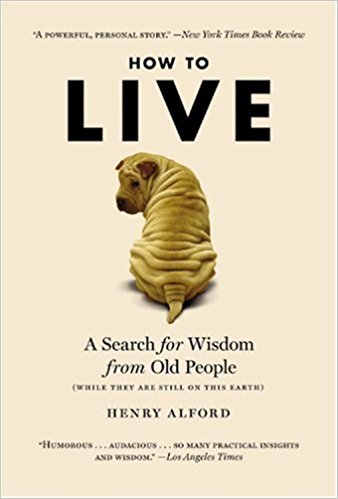 How to Live: A Search for Wisdom from Old People (While They Are Still on This Earth) Posted in: Views from the Oldest among Us
How to Live: A Search for Wisdom from Old People (While They Are Still on This Earth) Posted in: Views from the Oldest among UsBy Henry Alford – Twelve, 2009
Henry Alford takes readers along as he interviews people over 70 about the concept of wisdom. He describes contemporary studies of the aging brain, scholarly studies of wisdom, and he throws in quotes from sages, ranging from Buddha to Muhammad Ali. Alford’s interviewees discuss everything from the importance of living in the moment to the way they feel about dying. For instance, playwright Edward Albee disapproves of death as a “terrible waste of time,” while spiritual leader Ram Dass says he has a “very friendly attitude to it.” In the end, the wisdom in the book comes mostly from Alford himself as he pulls ideas together.
Interspersed is the saga of Alford’s mother’s divorce, which occurred while he was writing How to Live. This engrossing story of a woman willing to make a new life for herself at 79 definitely holds your interest, though it may not have much to do with wisdom. How to Live offers few earthshaking insights but lots of small epiphanies.
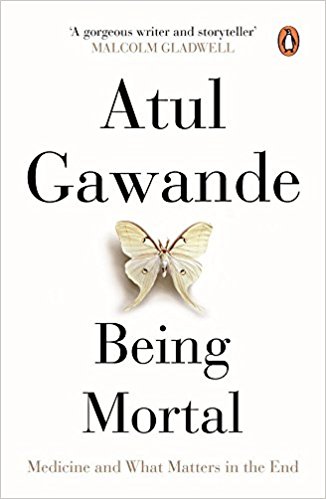 Being Mortal: Medicine and What Matters in the End Posted in: Insights from Bold Thinkers, Life’s Endings
Being Mortal: Medicine and What Matters in the End Posted in: Insights from Bold Thinkers, Life’s EndingsBy Atul Gawande – Picador, 2015
With increased longevity in the news, you don’t have to look hard to find a book about living better. But after watching his father’s death, physician Atul Gawande asks if we could be dying better. The advent of improved medicine and life-extending options means those who are terminally ill may die only after years of uncomfortable and expensive interventions—and without fulfilling their goals for the time remaining. Both in his medical practice and when his father became terminally ill, Gawande recognized how ingrained it is for physicians to try to fix and cure when what is needed is care and a listening caregiver. Now he wants us all to see what he sees, that everyone has desires, needs and goals, no matter how long they have left. Let’s listen.
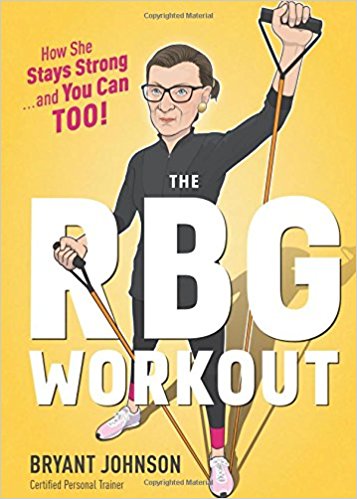 The RBG Workout: How She Stays Strong … and You Can Too! Posted in: Guides to Aging Well, Views from the Oldest among Us
The RBG Workout: How She Stays Strong … and You Can Too! Posted in: Guides to Aging Well, Views from the Oldest among UsBy Bryant Johnson – Houghton Mifflin Harcourt, 2017
This terrific little book packs a punch, or at least a kick or two. Personal trainer Bryant Johnson shares the exercise routine he developed for US Supreme Court Justice Ruth Bader Ginsburg. Complete with illustrations and tips, the book takes us through the workout, with bonus anecdotes about the pair’s long friendship. (Ginsburg calls Bryant the most important man in her life.) The workout is indeed challenging. Planks! Medicine balls! But it’s also designed so you can do it at home with minimal gear. So instead of being intimidated, let this inspire you. After all, 85-year-old Ginsburg has been doing this for a long time, and she’s on top of her game—in the gym and on the bench.
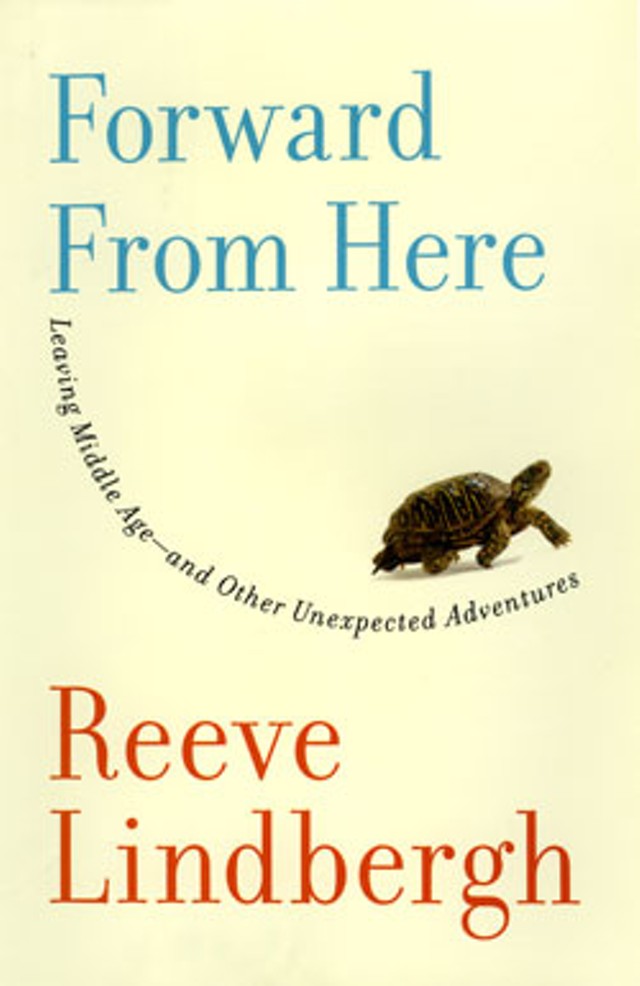 Forward from Here: Leaving Middle Age—and Other Unexpected Adventures Posted in: Memoirs
Forward from Here: Leaving Middle Age—and Other Unexpected Adventures Posted in: MemoirsBy Reeve Lindbergh – Simon & Schuster, 2008
In this gentle memoir, Reeve Lindbergh offers a thoughtful and positive perspective on aging. Describing her life in rural Vermont, she reflects on turning 60. Her book is moving and often amusing, whether she’s describing birds that took over the trees in her yard or the benign brain tumor—she named it Alice—that she lived with for six months. The last chapter recounts what happened after the news broke in 2003 that her father, aviator Charles Lindbergh, had three secret families in Europe, and that she had half brothers and sisters she hadn’t known existed.
Lindbergh notes that when she was 12, she hoped she would never grow older. Now, as she enters the period that her mother, author Anne Morrow Lindbergh, called “the youth of old age,” she is gradually coming to terms with aging and has lost most of her fear of dying. This collection of reflective essays has appeal for all.
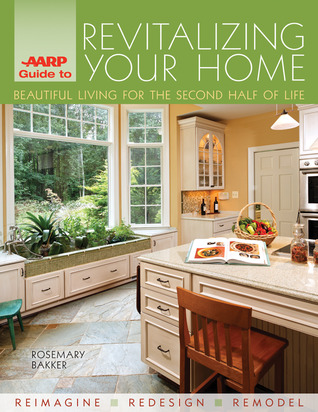 AARP Guide to Revitalizing Your Home: Beautiful Living for the Second Half of Life Posted in: Guides to Aging Well
AARP Guide to Revitalizing Your Home: Beautiful Living for the Second Half of Life Posted in: Guides to Aging WellBy Rosemary Bakker – Lark, 2010
With enticing color photos on every page, this book is a thorough guide to making a home a safe, comfortable place to live, either for yourself as you grow older or if you are caring for an aging loved one. Experienced in gerontology and interior design, Bakker starts with a checklist for assessing your home inside and out. She then discusses rooms and features in detail, including stairways, flooring and lighting. There are excellent ideas for every budget, from redesigning an entire kitchen to highlighting the edges of steps for better visibility. Dozens of sidebars give tips about safety, energy efficiency and promoting health and longevity. Not every home is suitable for a makeover, particularly if it has cramped rooms or too many stairs, or if the community lacks public transportation or adequate medical services. If you need to move, this book can help you evaluate your options. Browse, plan—then take practical action.
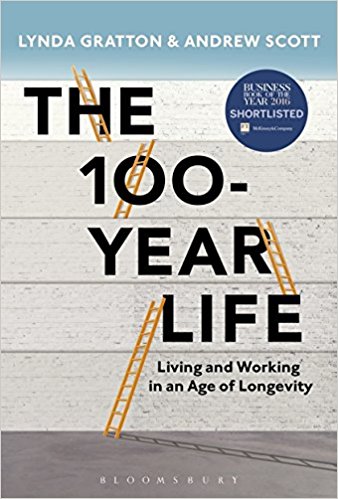 The 100-Year Life: Living and Working in an Age of Longevity Posted in: Insights from Bold Thinkers
The 100-Year Life: Living and Working in an Age of Longevity Posted in: Insights from Bold ThinkersBy Lynda Gratton and Andrew Scott – Bloomsbury, 2016
Today’s 60-year-olds have a better-than-even chance of reaching 90 or more, and the majority of today’s infants will live to at least 105, according to the authors, both professors at the London Business School. But, they argue in this fascinating book, people will need to organize their very long lives quite differently. To support themselves for 100 years, they will have to keep working through their 70s and perhaps even into their 80s. And they’ll need to live multi-stage lives, with transitions between the stages—time to rethink goals, retool skills and possibly change careers altogether. The authors acknowledge that the rich, who already live longer than the poor, are also more likely to have the education and the financial and personal resources to adapt to a multi-stage life, but overall this is an optimistic take on the future, offering both personal advice and public policy suggestions.
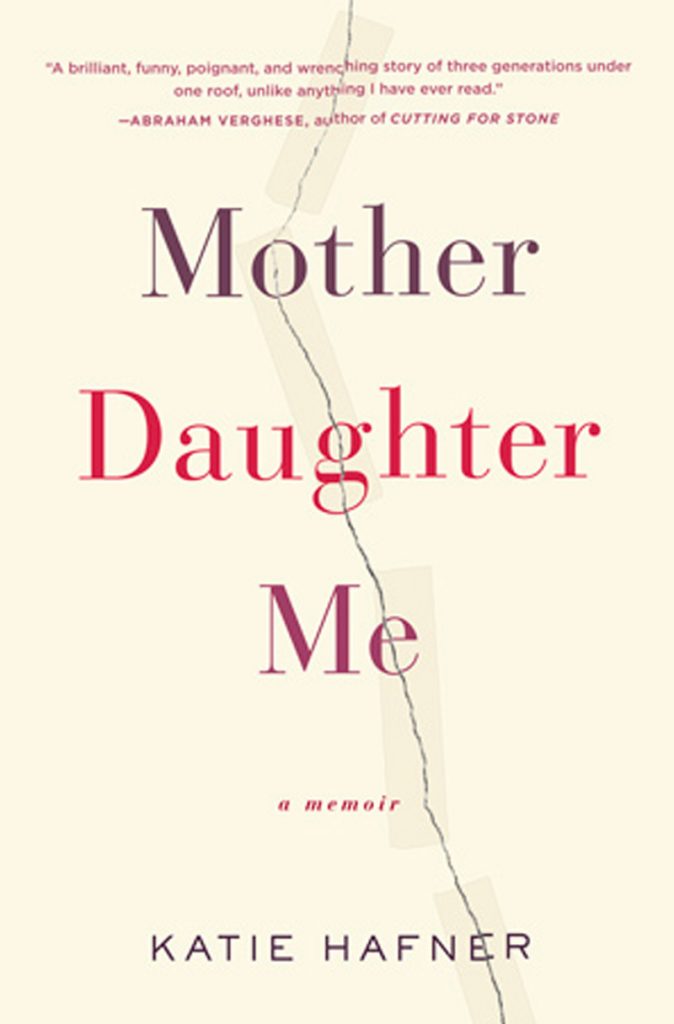 Mother Daughter Me: A Memoir Posted in: Memoirs
Mother Daughter Me: A Memoir Posted in: MemoirsBy Katie Hafner – Random House, 2013
Katie Hafner and her teenage daughter, Zoë, have made great strides in picking up the pieces after the sudden death of Hafner’s husband. So when Katie’s 77-year-old mother, Helen, suggests they all move in together, unwarranted optimism fuels their decision to do so. Maybe issues from Katie’s complicated and unhappy childhood could be resolved. But a rift between Helen and Zoë quickly jeopardizes the mother-daughter bond. Even therapy can’t help. Hafner is honest and matter-of-fact, but with the fallout from Helen’s alcoholism, there’s too much unfinished emotional business, and the trio’s best intentions fall short. A moving, must-read memoir for anyone in the sandwich generation once again living with parents—or considering such an arrangement.
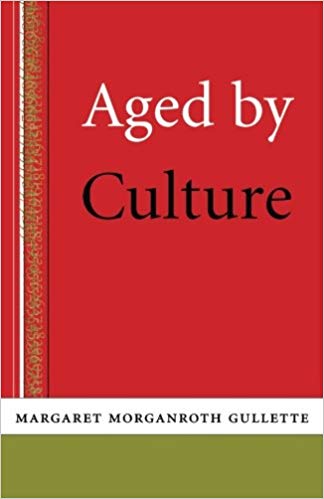 Aged by Culture Posted in: Insights from Bold Thinkers
Aged by Culture Posted in: Insights from Bold Thinkers“We are aged more by culture than by chromosomes,” Margaret Gullette writes in this passionate indictment of the American attitude to aging. Her book spells out the price we pay for living in a culture that’s obsessed with youth and that sees aging as a demeaning process of decline. Gullette focuses most on middle-ageism, noting that we’re encouraged to think of ourselves as old at younger and younger ages. Many Americans buy into such ideas and are barely into midlife when they begin to complain about memory lapses and senior moments. Middle-ageism has eroded workplace seniority systems that reward experience and has cost many people age 40 to 60 their jobs as they were pushed aside to make way for younger employees. Gullette is a resident scholar in the Women’s Studies Research Center at Brandeis University.
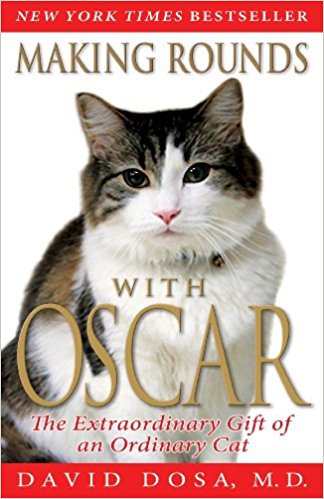 Making the Rounds with Oscar: The Extraordinary Gift of an Ordinary Cat Posted in: Life’s Endings
Making the Rounds with Oscar: The Extraordinary Gift of an Ordinary Cat Posted in: Life’s EndingsIf you relish a true story that showcases the animal-human connection, you’ll want to meet Oscar, a cat with a unique ability to sense when a person is about to die. Oscar lives in the dementia unit of Steere House nursing home in Providence, RI, where we make the acquaintance of feline-averse David Dosa, MD, and his staff, patients and families. This is more than a cat tale, it is the coming-of-age story of Dosa, a compassionate but skeptical geriatrician who learns to trust this tabby cat, his nurses and his instincts, as he witnesses the comfort and acceptance that come with a visit from Oscar. With uncanny accuracy, Oscar jumps up and steadfastly remains on the beds of patients in their final hours. This is an insightful, warm and illuminating read about end-of-life choices and the unlikely friends who might be there to guide us.
Click here to view short David Dosa video.
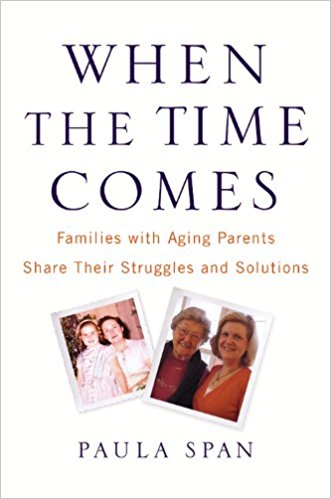 When the Time Comes: Families with Aging Parents Share Their Struggles and Solutions Posted in: Guides to Aging Well, Life’s Endings
When the Time Comes: Families with Aging Parents Share Their Struggles and Solutions Posted in: Guides to Aging Well, Life’s EndingsWhen older people develop health problems that make it risky to live alone, families have a number of options. Journalist Paula Span, who writes the “New Old Age” blog for the New York Times, explores five possibilities. She lays out the pros and cons of staying put with help from relatives or aides; moving in with adult children; moving to an assisted living facility; entering a nursing home; and getting hospice care.Span interviews families who chose each option and follows their progress as the older generation adjusts—successfully or not—to new circumstances. She provides thoughtful advice, points out common pitfalls and explains in detail what the different choices cost. Anyone who is, or may become, a caregiver will find a wealth of information and comfort here.
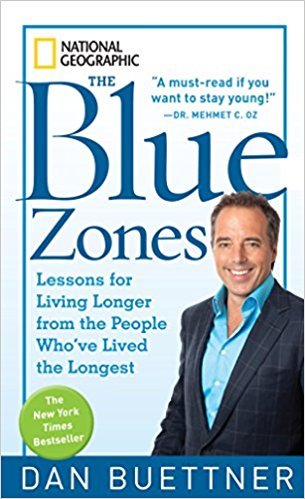 The Blue Zones: Lessons for Living Longer from the People Who’ve Lived the Longest Posted in: Guides to Aging Well, Views from the Oldest among Us
The Blue Zones: Lessons for Living Longer from the People Who’ve Lived the Longest Posted in: Guides to Aging Well, Views from the Oldest among UsHow do some people manage to live so long? Explorer and journalist Dan Buettner looked for answers to this question by identifying blue zones, regions with high concentrations of very old people, and analyzing lifestyles in four of them: a mountainous area of Sardinia; rural villages in Costa Rica; the tiny islands of Okinawa; and Loma Linda, California, home to 9,000 Seventh-day Adventists. Buettner brings these places and people to life, interweaving profiles of the very old and interviews with experts on aging. In the final chapter, he presents nine longevity lessons. Among other things, he recommends eating less meat, incorporating more physical activity into your life (walk, don’t drive) and having a strong sense of purpose. If you follow his suggestions, there’s no guarantee you’ll live to 100, but he argues convincingly that you can add at least 10 healthy years to your life.
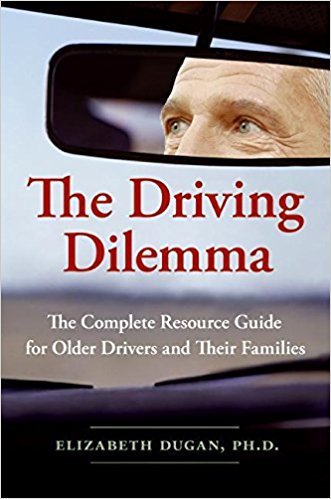 The Driving Dilemma: The Complete Resource Guide for Older Drivers and Their Families Posted in: Guides to Aging Well
The Driving Dilemma: The Complete Resource Guide for Older Drivers and Their Families Posted in: Guides to Aging WellHere’s the dilemma: most Americans outlive their ability to drive safely by seven to 10 years. Because driving means independence, older people often resist when their adult children suggest they’re at risk behind the wheel. Elizabeth Dugan, PhD, a researcher on geriatric issues at the University of Massachusetts Medical School, has written a practical and compassionate guide for both generations. She describes warning signs that driving ability is deteriorating, and medical disorders and medications that can create problems. Addressing concerned family members, she explains a counseling technique called motivational interviewing and includes scripts that illustrate how to approach the subject of giving up the car keys in a nonconfrontational way. Useful appendixes offer detailed information on where to find help with the driving dilemma, both from national organizations and in each state.
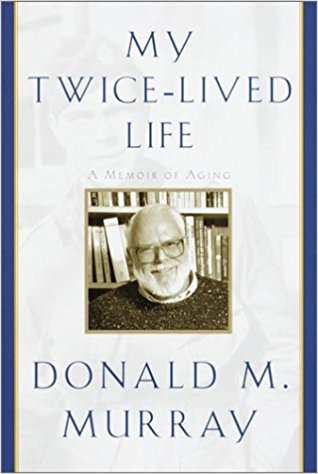 My Twice-Lived Life: A Memoir Posted in: Memoirs
My Twice-Lived Life: A Memoir Posted in: MemoirsColumnist Don Murray, newly retired and recovering from a near-fatal heart attack at age 62, decides to write about his own aging and, in the process, feels compelled to revisit his past. Attempting to understand what made him the man he is, he describes his lonely childhood, life in combat in World War II, and his careers, first as a Pulitzer Prize-winning journalist and then as a college professor. Murray, who died in 2006, writes movingly about his daughter’s death and about caring for his wife, who has Parkinson’s disease. As time passes, he grows and changes as he acknowledges the pain of past events and his own insecurities, which he had tried to hide from others. His beautifully crafted memoir opens a window on aging as seen from a distinctively male perspective.
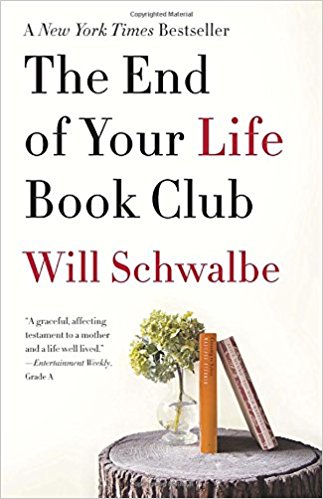 The End of Your Life Book Club Posted in: Life’s Endings, Memoirs
The End of Your Life Book Club Posted in: Life’s Endings, MemoirsDon’t let the title of this inspirational tale fool you into thinking this is a book about death. There is nothing morbid about this memoir. This is a story of devotion—of a terminally ill woman to her many philanthropic pursuits, a son to his mother, and both mother and son to a shared love of books. Schwalbe is a publisher, a wordsmith and lover of literature. His mother is a fascinating humanitarian; one of her accomplishments was helping to build a library in Afghanistan. They were already close, and the mother-son bond only gets stronger as Mary Anne faces a diagnosis of stage IV pancreatic cancer. In doctors’ offices and at bedsides, together they enjoy the comfort that the printed word gives them, the joy of sharing books that have affected them over the years. This book club offers a double love story, a shared journey and a treasure trove of books to add to your own reading list.
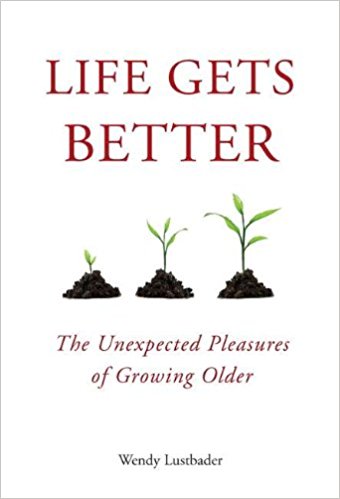 Life Gets Better: The Unexpected Pleasures of Growing Older Posted in: Guides to Aging Well, Insights from Bold Thinkers, Views from the Oldest among Us
Life Gets Better: The Unexpected Pleasures of Growing Older Posted in: Guides to Aging Well, Insights from Bold Thinkers, Views from the Oldest among UsAre you afraid to grow old, dreading senior moments and lost independence? Is it folly to expect any pleasure in aging? In this positive book, social worker and geriatrics expert Wendy Lustbader reveals what she’s learned by working with older people: there is indeed plenty to look forward to in our later years.Whether you are looking ahead for yourself or searching for insight on older loved ones, Life Gets Better offers illuminating stories from those in midlife and beyond. The keys to happiness, shares Lustbader, are choosing battles wisely, forgiveness and gratitude. She tells us there is self-satisfaction from surviving life’s trials; the pleasure comes in knowing what really matters. Lustbader doesn’t imply that the best is yet to come. She proposes that the worst may be behind us.
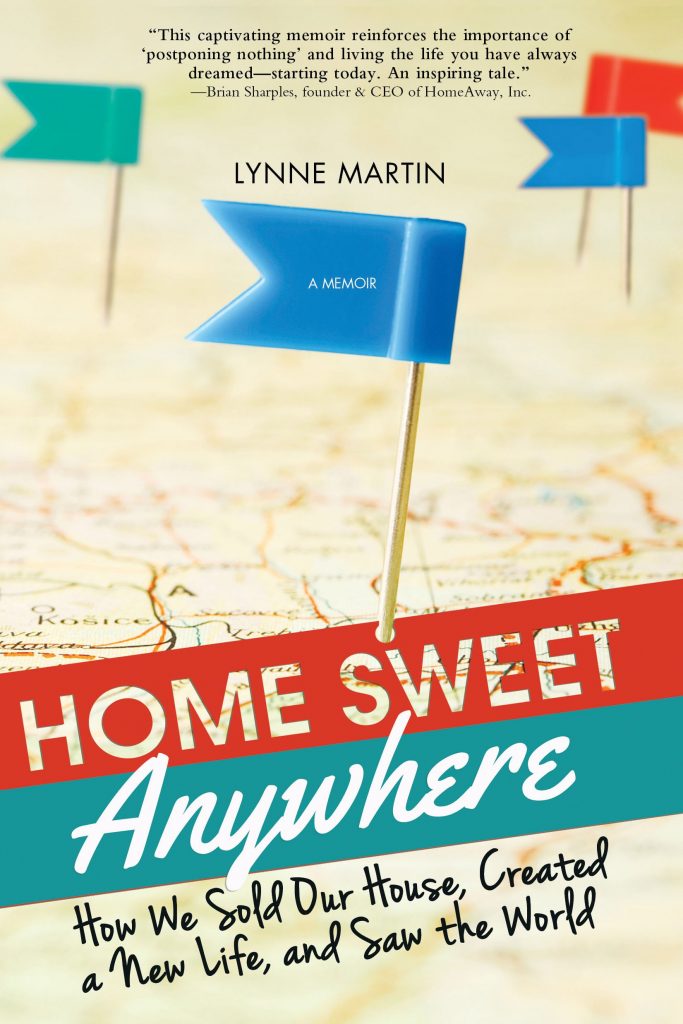 Home Sweet Anywhere: How We Sold Our House, Created a New Life, and Saw the World Posted in: Inspiring Journeys, Memoirs
Home Sweet Anywhere: How We Sold Our House, Created a New Life, and Saw the World Posted in: Inspiring Journeys, MemoirsBy Lynne Martin – Sourcebooks, 2014
If the idea of aging in place is too tame for you, you may want to take your retirement on the road—permanently. Lynne and Tim Martin, both in their 60s with grown children from previous marriages, find they have unrealized wanderlust. They empty their home of all they can bear to part with, sell the house and leave the country for one extended stay after another. Lynne is a writer/foodie/wine lover; Tim’s the travel planner. These nomadic retirees are outgoing, flexible and practical—qualities they’ll need along the way, living as locals in rented and borrowed apartments or as house sitters. This memoir is full of travel tips if you’re bold enough to follow the Martins’ lead, and it’s colorful enough to enjoy if you never want to leave your reading chair.


